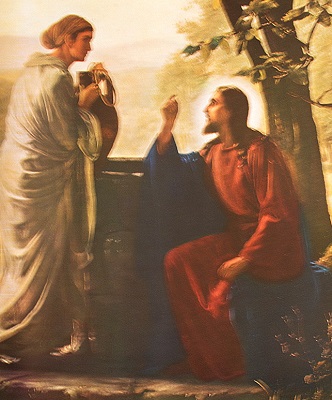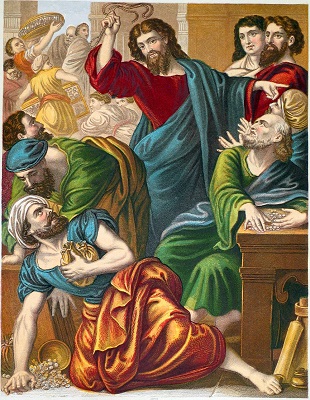The Chronological Gospel Ė
Jesusí Early Ministry
John 2:13-25, First Passover and first cleansing of the Temple (2/28/14)
After the wedding in Cana, Jesus and some of his new disciples returned to Jerusalem for the Passover. (Remember that his parents made the trip every year, as we saw in Luke 2:41.) Scholars are divided about whether the cleansing of the Temple happened twice or only once. Dr. Daniel has it happening twice; John Wesley agrees, and so do I. John described Jesusí first cleansing of the Temple, very early in his ministry.
John 3:1-21, Interview with Nicodemus (3/3/14)
It was apparently while Jesus was in Jerusalem for the Passover that Nicodemus came to see him. The Pharisees were, as a group, very religious and very set in their ways. During the course of Jesusí ministry, they demonstrated on several occasions that they didnít have much use for someone who seemed to them to be making radical changes. Nicodemus was a little more open-minded, but he still didnít understand what Jesus was telling him.
Remember that Greek has a beginning ďquotation mark,Ē but it doesnít have a marker for the end of a quotation. Scholars are unsure about where Jesus stops speaking in his interview with Nicodemus. Some translations think his words stop at vs. 13. Weymouth has him stop speaking at the end of vs. 15. Traditional red-letter editions have him stop speaking at the end of vs. 21. Many translations donít use quotation marks at all, so itís up to you to decide. Everybody (I think) agrees that Jesus is still speaking in vs. 12. The point is this: love one another and donít argue about it.
John 3:22-36, Parallel ministries of Jesus and John (3/4/14)
We know a lot about Jesusí time in Galilee, because Matthew, Mark, and Luke talk about that in detail. Only John spends much time talking about Jesusí ministry in Judea. One thing John tells us is that Jesusí early ministry in Judea overlapped Johnís ministry. That makes sense. After all, Judea was the land of the Jews, not Galilee. Galilee is way up north, north even of Samaria (see the map).
By the way, several translations that use quotation marks stop John the Baptistís remarks with vs. 30. You are free to make up your own mind, because Greek only tells us where a quotation starts, not where it stops. For what itís worth, I think vss. 31-32 sound a lot more like John the disciple than John the Baptist. Compare them with 1 John 1:1-5 and Matthew 3:7-12 and see what you think.
Luke 3:19-20, Mark 6:17-19, Matthew 14:5, Johnís imprisonment (3/5/14)
The history of the Herodian dynasty is like a daytime soap opera of the more intricate and seamier type. There were several Herods, all related to each other, ruling pieces of Judea and Palestine around the first century. Itís easy (and normal) to get confused about which one is which in scripture or history books. None of the Herods appear to have been morally upright.
John criticized Herod the Tetrarch (son of Herod the Great) for marrying his brother Philipís (divorced) wife while Philip was still alive. The wife, Herodias, was also a blood relative of Herod and Philip Ė a niece as near as I can tell Ė although that wasnít what bothered John; it was the unlawful divorce and resulting bigamy that he preached against. Herodias naturally resented John very much and wanted the Tetrarch to kill him. Herod the Tetrarch was afraid to go so far as that, so he just put John in prison.
Random Walk in a Gallery of Religious Art, Step 50: Matthew 4:12, John 4:1-24, Christ and the Samaritan Woman, by Carl Bloch (3/6/14 and 8/7/15)
|
Johnís imprisonment represented enough of a threat to Jesusí ministry that he decided to leave Judea for a while and return to Galilee. To get there he had to pass through Samaria (see the map). Although many Jews lived in Samaria and Galilee, those areas had not belonged to the Jews for about 750 years when Jesus started preaching. There was no love lost between the Jews and Samaritans, and Jewish men would not ordinarily speak to a woman in public. The Samaritan woman was surprised when Jesus asked her for a drink of water, but when she realized that he was a prophet, her curiosity overcame her surprise. When Carl Bloch shows us Christ and the Samaritan Woman, neither of them is looking at us. Bloch shows us that Jesus is concentrating solely on her, and she in turn is studying him, trying to figure out what heís all about. Personally Iíve always had difficulty with portrayals of Jesus that show him focusing somewhere off into space when heís talking to somebody (a la Franco Zeffirelli, for example). I have the idea that when Jesus was with you, you were the focus of his universe. If you read a little farther in this passage to vs. 27, youíll see that even his disciples wouldnít interrupt him in his conversation with the Samaritan woman. Previous Step. Next Step. |
 "Christ and the Samaritan Woman" by Carl Bloch, from the Gamble family Bible, now in the private collection of Regina Hunter. Click to enlarge. Photography by Daryl Lee. |
John 4:25-43, Jesus returns to Galilee via Samaria (3/7/14)
Jesus was never too rushed to talk to people, not even Samaritans. He spent a couple of days in the Samaritan village of Sychar (see the map, where it might be the town in D3), and then he got back on the road to Galilee. Many of the townspeople came to believe in Jesus, even in that short time.
More of The Chronological Gospel
Birth Announcements and Early Lives of Jesus and John the Baptist
Early Ministries of Jesus and John the Baptist
Jesusí Early Ministry
Jesusí Galilean Ministry
Sabbath Controversies
The Sermon on the Mount
The Sermon on the Plain
John the Baptist
Signs and Parables
Miracles and Mission Trips
Bread of Life
Miracles and Meanings
Transfiguration and Teachings
To Jerusalem for the Festival of Tabernacles
Some Results of Lukeís Research
Light
More of Lukeís Research
On the Road Again
The Raising of Lazarus
Holy Week: Palm Sunday and Monday
Holy Week: Tuesday, Parables and Questions
Holy Week: Wednesday Part 1, Discussions
Holy Week: Wednesday Part 2, Be Ready!
Holy Week: Thursday Part 1, Jesus' Celebration of the Passover
Holy Week: Thursday Part 2, Jesus' Farewell Discourse
Holy Week: Friday Part 1, Jesus' Arrest and Two Informal Trials
Holy Week: Friday Part 2, More Trials
Holy Week: Friday, Part 3, and Saturday, Jesus' Death and Burial
The Empty Tomb
Final Appearances of Jesus Prior to Pentecost
Copyright 2014, 2015, 2021 by Regina L. Hunter. All rights reserved. This page has been prepared for the web site by RPB. The image of the moneychangers being driven from the Temple is from the Binns family Bible, now in the private collection of Regina Hunter.
Opinions expressed on this page are solely those of the author, Regina Hunter, and may or may not be shared by the sponsors or the Bible-study participants. Thanks to the Holy Spirit for any useful ideas presented here, and thanks to all the readers for their support and enthusiasm. All errors are, of course, the sole responsibility of the author.
Our Sponsors:
St. John's United Methodist Church, "Transforming Lives Through Christ."
2626 Arizona NE, Albuquerque, New Mexico 87110
St. John's Music Ministries now has a YouTube channel, bringing you free concerts and choral music. Check it out!
Traditional worship services are held Sundays at 8:15 and 11:00 a.m. in the sanctuary. Casual worship services are held Sundays at 9:30 a.m. in the Family Life Center. Jazz Vespers are held monthly on the second Saturday at 5:00 p.m. in the sanctuary. St. John's feels especially called to the worship of God and to the service of our neighbors through our music program.
Storm Dragon SoftwareTM
Ducks in a Row, Inc.
This website is supported in part by the generosity of Mrs. J. Jordan.
